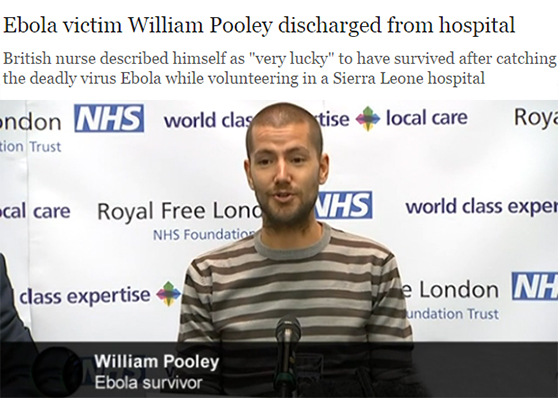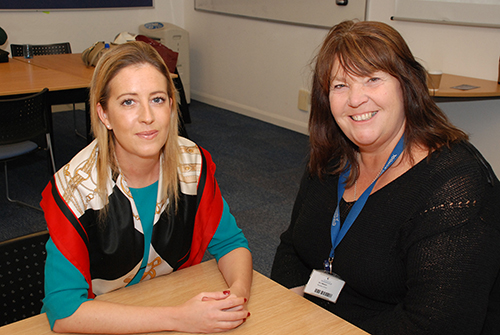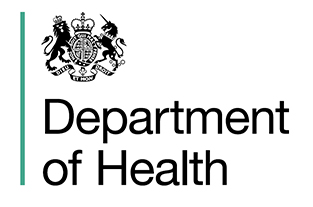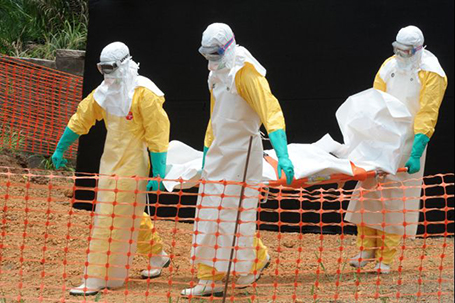DoH comms head lectures on Ebola crisis management action plan

Wed, 09 Dec 2015 13:03:00 GMT
The Department of Health’s Deputy Head of News Rachel Carr explained the action taken when the first British national, William Pooley, contracted the disease
►  Speaker Rachel Carr (left) with the University’s Dr Julia Meaton from the Centre for Sustainable and Resilient Communities
Speaker Rachel Carr (left) with the University’s Dr Julia Meaton from the Centre for Sustainable and Resilient Communities
THE most widespread virus disease epidemics in history is still ongoing in West Africa and has been since 2014. But how did the UK’s Department of Health (DoH) avert a national crisis when UK nationals had to come home to be treated from the life-threating Ebola disease?
This was revealed to students from the University of Huddersfield when Rachel Carr, Deputy Head of News with the DoH, came to talk as part of a guest lecture series from the University’s Centre for Sustainable and Resilient Communities.
The first British national caught Ebola whilst volunteering in Sierra Leone and it was the 2014 August Bank Holiday.
 “A lot of colleagues were on holiday,” said Rachel. “But, nevertheless, when the call came in at 6am on the Saturday morning saying a nurse from the UK had caught the Ebola virus, a plan had to be put in place.”
“A lot of colleagues were on holiday,” said Rachel. “But, nevertheless, when the call came in at 6am on the Saturday morning saying a nurse from the UK had caught the Ebola virus, a plan had to be put in place.”
The victim, William Pooley aged 29, was flown back to the UK by the Royal Air Force and taken to London’s Royal Free Hospital. However, even though the outbreak of Ebola had been ongoing since 2013, it was a crisis that the Department of Health wasn’t really ready for, as it ‘was much more focused on planning for the NHS’s resilience during the upcoming winter months’, Rachel said.
At the very beginning of any crisis, Rachel advised the students to bring everyone together, so the communications campaign can be handled swiftly and successfully.
 “If you have the public being fed conflicting information through the media, it causes confusion and people begin to panic,” said Rachel. “To avoid this, I brought together the team, from their remote locations, into Richmond House in Central London and this was a crucial factor to how a national crisis was averted.”
“If you have the public being fed conflicting information through the media, it causes confusion and people begin to panic,” said Rachel. “To avoid this, I brought together the team, from their remote locations, into Richmond House in Central London and this was a crucial factor to how a national crisis was averted.”
Rachel entertainingly added: “If you happen to find yourself in a similar scenario, make sure you know the Wi-Fi code for the building. This may seem trivial and ridiculous, but this actually happened. In a crisis, it is often the most practical things that matter the most.”
The communications expert told the students why it was important to not just inform the public, but to also keep your own staff up-to-date with information and used the nurses’ strike in Spain as an example, after they refused to work when a nurse contracted the disease. The last thing you want, said Rachel, is panic within the workforce.
From having a little black-book with vital contacts in it, to having strict guidelines on who will feed the facts and figures to the media, Rachel gave the students a valuable insight into how the DoH handled one of their biggest communication crises in recent history.
Thankfully, William Pooley survived, but as Rachel said, they had to be prepared for any eventuality.
Rachel and her team, as well as handling the communications, worked alongside numerous Government departments throughout the campaign to ensure they were all working efficiently and collaboratively, no mean feat considering the size of the departments involved. These included the departments of Health, International Development, Cabinet Office, NHS England and Public Health England.
These departments and the people involved have since been recognised for their achievements and have won numerous awards for their handling of the Ebola outbreak.







